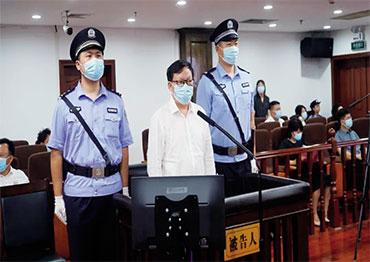Zhou confessed he wanted to make himself stand out among his peer officials by building large projects to impress his superiors. He admitted some projects were launched without sufficient research.
Furthermore, Zhou tried to profit from these projects. He offered contracts to relatives or close friends, through which he got kickbacks of up to 10 million yuan (US$1.48m). Within five years, Zhou increased government debt to invest in 32 large projects, each of which amounted up to 10 million yuan. Among these, 16 projects were contracted by people he directly nominated. In contrast to these expensive investments, annual fiscal revenue in Jiangyong County is only 300 million yuan (US$44.41m).
Within the six months from April to September 2021, three county-level Party secretaries, including Zhou Lifu, in Yongzhou, which administers Jiangyong County, were fired because of corruption involving vanity projects. In February, Yongzhou city government announced a yearlong campaign among officials to a reflect upon the corruption misdeeds of certain officials.
Vanity projects, often referred to in Chinese media as image projects, have been a problem in recent years. According to a documentary by the CPC Central Commission for Discipline Inspection (CCDI), in September 2018, Fuyang Municipal Party Committee in Anhui Province ordered the 153 townships and villages within its jurisdiction to improve the exterior appearances of its buildings. One of them, Gaotai Township, Funan County, notorious for its harsh environment and underdeveloped infrastructure, spent 7.99 million yuan (US$1.18m) to whitewash all of the houses.
Despite repeated criticism of the provincial and central authorities against the whitewashing campaign, the town proceeded with the project. In June 2019, Li Ping, Fuyang municipal Party secretary, was dismissed, after receiving several warnings and criticisms from higher authorities.
According to reports in May 2015 by The Paper, Fengshan County in Guangxi Zhuang Autonomous Region, a State-level impoverished county, allegedly spent 53.5 million yuan (US$7.91m), or half the county’s annual fiscal revenue, to carve two phoenixes on a cliff face. After a local government investigation, it was disclosed that Huang Deyi, former Party secretary of Fengshan County, embezzled public funds for natural disaster prevention and control to have the phoenix murals carved, at an actual cost of 2 million yuan (US$300,000).
On July 2, during a provincial level working conference, Zheng Zhajie, Party secretary of Anhui Province, criticized local officials over vanity projects. “For example, a less-developed county has built a 12- lane road, but very few cars ever use the road,” Zhen said. He said it results from distorted political achievements and wrong decision-making by some local officials.

 Old Version
Old Version

